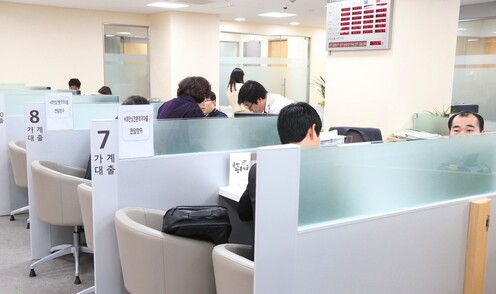
Hankyoreh material photo. Reporter Lee Jung-woo.
Banks are re-treating some household credit products that were temporarily suspended last month. KB Kookmin Bank, which decided not to temporarily handle credit loans exceeding 20 million won last month, announced on the 3rd that it would lift such measures from the new year. It is also possible to resume’other bank loans’ to repay mortgage loans from other banks, and to recruit loans from loan counselors. Shinhan Bank, which temporarily suspended the reception of household credit loans at the end of last month, will also resume accepting applications from the 4th. Non-face-to-face credit loans, such as the’convenient office worker credit loan’, which was once discontinued, have also been accepted since the 1st. Woori Bank is also planning to resume handling of the non-face-to-face employee credit loan product’WON’ for employee loans, which was discontinued last month. Nonghyup Bank decided to raise the limit on the preferential interest rate for household loans at branches, which had been lowered once, from the 4th. The preferential interest rate for housing mortgage loans with variable interest rates is changed from 1% to 1.4%, and the preferential interest rate on credit loans is changed from 0 to 0.25% to 0.8 to 1.2%. Commercial banks temporarily reinforced the standard for household credit loans at the end of the year to control the pace of the increase as household loans surged in November last year. In addition, banks seeking to introduce’Basel 3′, which is advantageous for improving bank soundness indicators, had to match household loans and corporate loans in the fourth quarter, further tightening household loans. After closing in 2020, this demand has declined, and banks are gradually lowering their lending thresholds. However, restrictions on loans to high-income earners remain for a while. This is because bank loans are being used for investment in assets such as real estate and stocks for high-income people rather than emergency funds for financially vulnerable groups, and as a result, the asset bubble has grown. Hana Bank decided to implement a plan from the 6th to lower the basic loan limit for professionals such as doctors and legal professionals from 150 million won to 50 million won. Shinhan Bank will also continue to lower the limit for professional loans from 300 million won to 200 million won. The policy that the financial authorities decided to apply the total debt principal repayment ratio (DSR) to loans exceeding 100 million won for high income earners with an annual income exceeding 80 million won in November last year is also maintained. By Shin Da-eun, staff reporter [email protected]
